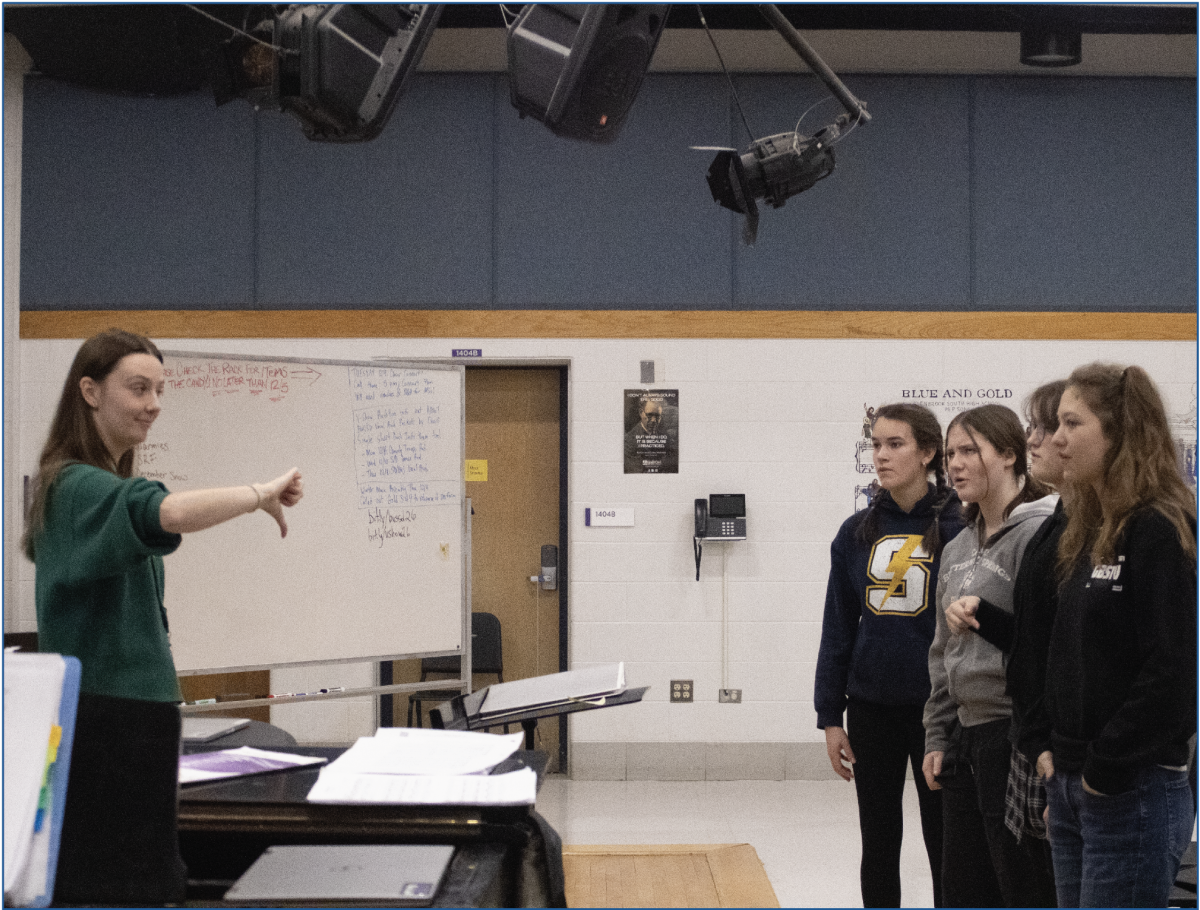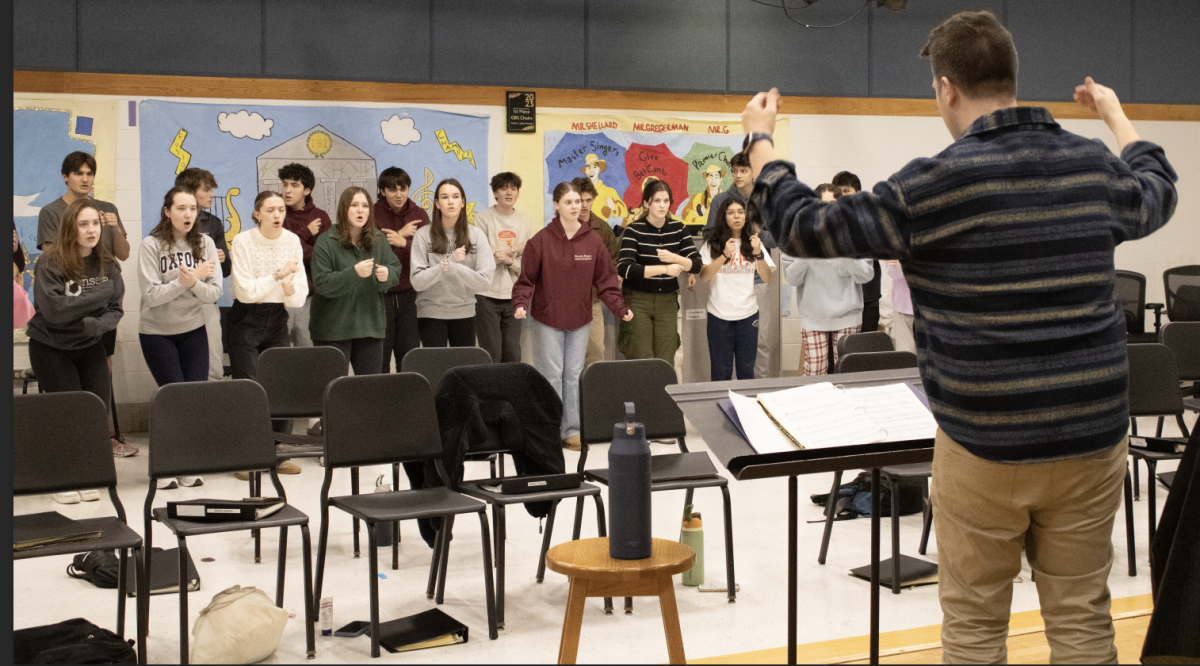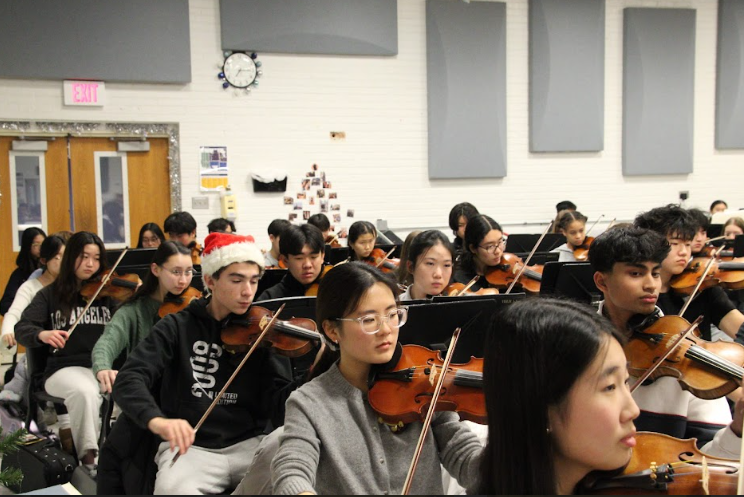It’s halftime on South’s home turf and the football fans quiet down to watch the show unfold. After Poms ignite the crowd, the South marching band, dressed in blue, white and gold takes the field. Led by the three Drum Majors, Joe Lee, Bridget Nelson and Jack Kramer, who conduct the band, the roughly 160 participants begin in a rigid formation. All at once, they begin to sway.
From there, they continue to march in a tight, patterned structure while playing their instruments. This show is a demonstration of control, cadence, and practice; it epitomizes what band is all about.
According to Band Director Greg Wojcik, marching band is both a graded class and an extracurricular activity that focuses on performance and competition.
“Marching band is a class, but what we do on Tuesday and Thursday nights is put all the bands together,” Wojcik said. “[…] Grades are based off of performance at the contests and their participation, making sure they’re at the football games and stuff. The most important [thing] to me is their musicality and how well they perform.”
The guard is an extension of marching band that adds the visual element to the show, according to Guard Captain Julia Albano.
“We do a lot of dancing,” Albano said. “It’s very dance-heavy because that’s what marching shows have been moving towards over time, […] This year [the show] is going to mainly consist of rifles, flags and a lot of dancing because [the theme] is ‘Visions of Argentina.’”
Recently, the marching band’s performance content has shifted away from easy pop sounds and has begun to focus on a more symphonic style. This stylistic change was put into place to make band more educational and to help the group compete at a higher level, according to Aaron Wojcik, assistant band director and son of Greg Wojcik.
“By adopting the symphonic [style of] music and putting it on the field we’re actually approaching a little bit more of a difficult task because we have more complicated music that we’re playing, [and] more complicated concepts that we’re throwing out there from an educational standpoint,” Aaron said. “It’s competing at a higher level with our material.”
Because the material is challenging, a lot of practice is required to get the music down. The members of band spend a lot of time together, which lends to the tight-knit reputation of the group, according to Emma Yonkers, trombone section leader.
“We’re all best friends,” Yonkers said. “’One band, one family’ is what we say.”
Greg insists that this community feeling extends beyond the walls of the band room and into South as a whole.
“I look at [the band] not as a contest band, I never have,” Greg said. “I look at [the band] as a support for Glenbrook South and for our community. […] I really feel we need to support our football team, our school, our basketball team, all the sports organizations and of course, the school environment.”
This year’s group has key qualities that contribute to productivity, according to Lee.
“Definitely this year I think all of the members have a lot more energy and they show more commitment than previous years,” Lee said.“Through this, we are able to get a lot more work done.”
Both Aaron and Greg believe that leadership is another strong quality of this year’s band.
“I think our strength is leadership,” Greg said. “When we put this band together we have a unique sound, balance, blend and all that other stuff, so this band is really a fine band.”
This unique sound is made possible by the large number of people that participate in band. According to Erika Peterson, mellophone section leader, this large number adds to the experience of the group.
“It’s really cool when your team isn’t just 12 players,” Peterson said. “You see the same faces, you’re familiar with everyone’s faces, but you still have the opportunity to meet new people all the time, which is really cool.”
The band program was voted most improved band in their conference last year, according to Yonkers.
This improvement would not be possible without the many opportunities that band has to offer, and students should take advantage of these opportunities and get involved with the band, Aaron said.
“We have so many different levels of programs here,” Aaron said. “[Seventh period] we have an exploratory instrumental program where, if you don’t know an instrument, you can come in and learn. Anyone is eligible for this class. […] We’re always open, our doors are always welcoming. If you don’t want to learn an instrument, we have guard, we have drumline; there are so many opportunities that are all open to those who want to participate.”
Band is not only a platform for learning music but also aids in the development of important life skills, according to Peter Roberson, trombone section leader.
“You learn really great social skills not only with friends, but with time management, efficiency, performance standards, how to practice, how to perform and how to work hard,” Roberson said.
According to Yonkers, band is a valuable experience that goes beyond just the activity itself.
“I would definitely say being a part of something this amazing [has impacted me],” Yonkers said. “The things that we do truly are really cool at the end when you put it all together […] It really is a community, we struggle together, we win together [and] we lose together.”







